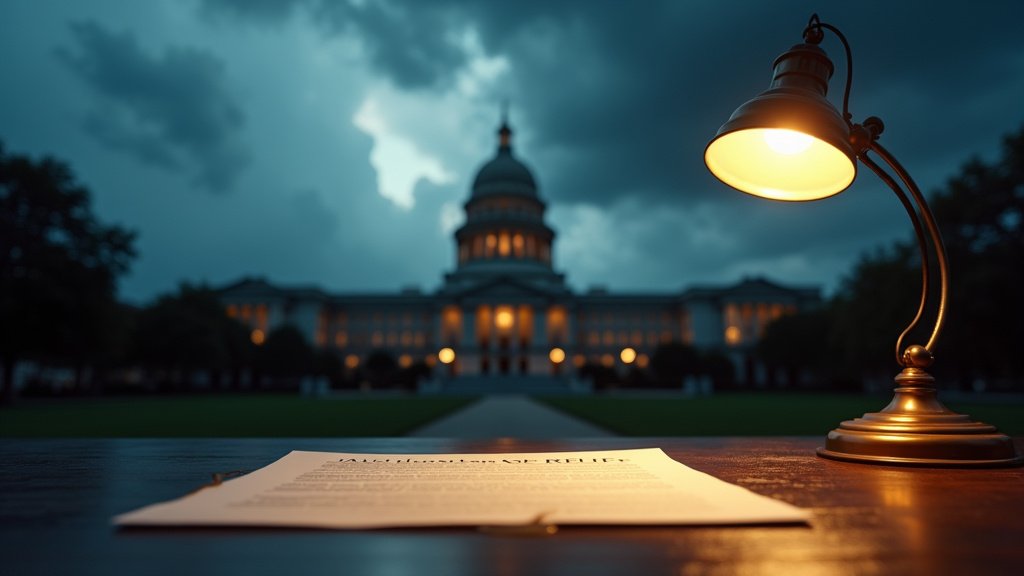The second special session of the 89th Texas Legislature drew to a close on September 4, 2025, capping off weeks of intense legislative activity that saw significant conservative victories, crucial flood relief measures, and the passage of a long-debated bill concerning gender identity in public facilities. However, a major point of contention—the regulation of hemp-derived THC products—remained unresolved in the legislative chamber, prompting immediate executive action from Governor Greg Abbott.
Governor Abbott had called lawmakers back to Austin for an extended period, expanding his agenda multiple times to address a range of priorities. The session, which began on August 15, 2025, and concluded earlier than its statutory deadline, was marked by partisan battles, including a repeat of Democratic quorum breaks that had previously derailed legislative proceedings. Ultimately, many of Abbott’s key agenda items successfully navigated the legislative process and reached his desk.
Congressional Maps Redrawn Amidst Partisan Strife
A central focus of the special session was the redrawing of Texas’s congressional maps. House Bill 4, a Republican-backed proposal, was passed by the Legislature and officially signed into law by Governor Abbott on August 29, 2025. This new map is widely expected to provide the Republican Party with a significant advantage, potentially securing five additional U.S. House seats for the GOP in the 2026 midterm elections. The process was fraught with political tension, following a previous Democratic walkout that had forced the end of the first special session. Despite Democratic opposition, which decried the maps as racially discriminatory and vowed legal challenges, the Republican majority pushed the bill through both chambers along party lines. Democrats had attempted to offer amendments to block the map’s implementation until various conditions were met, including the establishment of an independent redistricting commission or compliance with the Voting Rights Act, but these were rejected by the Republican majority.
THC Regulation Stalls in Legislature, Prompting Executive Action
Despite being a top priority for Governor Abbott, the regulation of consumable hemp products containing THC proved to be an insurmountable challenge for the Legislature. An impasse persisted between Governor Abbott, who favored a regulatory framework akin to alcohol or tobacco laws with age restrictions, and Lieutenant Governor Dan Patrick, who advocated for an outright ban. This deadlock led to the failure of any comprehensive THC legislation to pass both chambers. While a narrow ban on THC vape pens had gone into effect earlier in September from the regular session, the broader market remained largely unregulated. In response to the legislative inaction, Governor Abbott issued an executive order on September 10, 2025. This order mandates that sales of hemp-derived THC products be restricted to individuals aged 21 and older, requires retailers to verify government-issued identification, and directs state agencies to enhance enforcement. Lieutenant Governor Patrick publicly criticized the executive order, suggesting it inadvertently signaled approval for the current market and did not go far enough in protecting minors.
Swift Action on Flood Relief and Camp Safety
In a direct response to the devastating July 4th floods that swept through the Texas Hill Country, lawmakers allocated significant funding and enacted new safety measures. Approximately $280 million was appropriated from the state’s Rainy Day Fund to bolster flood relief efforts, match federal grants, and invest in emergency warning systems and weather forecasting. Key legislation, including House Bill 1 and Senate Bill 1, introduced new safety regulations for youth camps. These measures require camps to develop emergency action plans, establish warning systems, and prohibit the licensing of cabins located in vulnerable floodplain areas. The heightened focus on camp safety was a direct consequence of the tragic loss of 27 campers and staff at Camp Mystic during the July floods, which ranked among the state’s deadliest natural disasters.
Bathroom Bill Becomes Law After Decade-Long Debate
Senate Bill 8, dubbed the “Texas Women’s Privacy Act,” finally navigated the legislative process and passed, marking a significant policy shift after years of failed attempts. This bill mandates that multi-occupancy restrooms, locker rooms, and changing facilities in state agencies, schools, and universities be designated according to biological sex, defined by reproductive anatomy. The legislation imposes substantial civil penalties for non-compliance, with fines of $25,000 for a first violation and $125,000 for subsequent offenses, making it one of the most punitive laws of its kind nationwide. Supporters argue the bill is necessary to protect privacy and safety, while opponents contend it targets transgender Texans and could foster discrimination.
Other Notable Outcomes and Unresolved Issues
The legislative session also saw the passage of House Bill 7, which restricts the manufacture and distribution of abortion-inducing drugs, and a measure making ivermectin available without a prescription. Additionally, lawmakers enacted new rules to penalize legislators who leave the state to break quorum, a tactic previously used to obstruct proceedings. However, not all of Governor Abbott’s agenda items were successful. Efforts to pass significant property tax relief and measures to increase transparency regarding police misconduct stalled due to disagreements between the House and Senate.
Conclusion
The second special session of the 89th Texas Legislature concluded with a mix of decisive action and unresolved debate. Governor Abbott secured legislative wins on redistricting, flood preparedness, and transgender bathroom access, while the contentious issue of THC regulation underscored the deep divisions within the state’s Republican leadership. The passage of SB 8 and the new congressional maps are likely to shape Texas policy and politics for years to come, while the executive order on THC signals a temporary measure to address a lagging legislative priority. This trending news from Texas highlights the ongoing conservative policy push and the enduring partisan divides shaping the state’s future.






